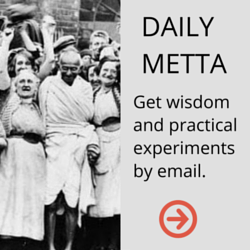April 27
 “None can be born untouchable, as all are sparks of one and the same fire.”
“None can be born untouchable, as all are sparks of one and the same fire.”
–Gandhi (Yeravda Mandir, p. 19)
While working to free India from external oppression, Gandhi also dedicated himself to reform within the Indian culture itself, particularly of what was known as “untouchability,” the doctrine that some people by birth have no place within the Hindu caste system, and are therefore considered almost less than human, forbidden to enter some temples, given only the lowest work to do, forbidden even to eat with “caste Hindus” and more. Despite some progress, the issue rightly continues to inspire ongoing efforts at uprooting it within the Hindu fold. (In fact the class known as “untouchables” in Gandhi’s day, have chosen to call themselves “Dalits” or “the oppressed,” to stress the point.)
In the true spirit of constructive program, which is, in a phrase, “building the world we want without waiting for others to give it to us,” he combined political change with conscious spiritual practice, making it an ashram observance (an ashram is a spiritual community) to efface “untouchability” and its violence from Hinduism.
While he did not, however, seek to immediately undo the caste system itself, close research strongly suggests that he was going in that direction. It appears that his overall goal was actually to end caste by going about it in a step by step, strategic manner, trying to bring people along with him to change their consciousness, which is where the seeds of “otherness” germinate. He began this uprooting process by maintaining that caste could exist without the concept of “high” and “low.” This is a very controversial topic that continues to inspire much debate. And Gandhi was killed by a Hindu fanatical group who felt he was diminishing the tradition. (The reality is that it is violence that diminishes any great tradition, and this is what Gandhi was pointing out.)
But let us not condemn Hinduism alone for this problem.
Sadly, there is the concept of the “outcast” in every society; there is the concept of caste in every society, even if it is called by another name. In every culture and religion, though we strive to do better, we continue see the treatment of human beings as less than human; we continue to perpetuate the false belief that by wealth, skin privilege, nationality — you name it, some lives matter more than others. And while we must work to put protective laws in place to keep such violence from being legal, we must also work to change consciousness around the existence of the “other.” This was Gandhi’s program in a nutshell. As wisdom traditions uphold, in our beautiful and healthily diverse human family, there can be no “other.”
Experiment in Nonviolence:
Think of one way you can contribute to global project of rehumanization.
 Daily Metta 2015, a service of the Metta Center for Nonviolence, is a daily reflection on the strategic and spiritual insights of Mahatma Gandhi in thought, word and deed. As Gandhi called his life an “experiment in truth,” we have included an experiment in nonviolence to accompany each Daily Metta. Check in every day for new inspiration. Each year will be dedicated to another wisdom teacher.
Daily Metta 2015, a service of the Metta Center for Nonviolence, is a daily reflection on the strategic and spiritual insights of Mahatma Gandhi in thought, word and deed. As Gandhi called his life an “experiment in truth,” we have included an experiment in nonviolence to accompany each Daily Metta. Check in every day for new inspiration. Each year will be dedicated to another wisdom teacher.








